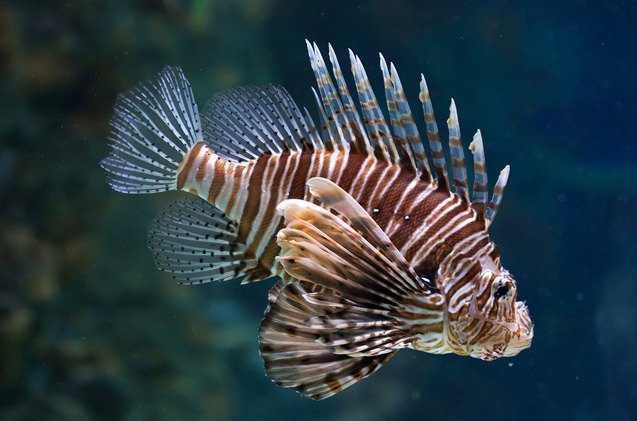Risky Business: Four Types of Dangerous Aquarium Fish


If you like to live life on the edge, and prefer to think outside of the box when it comes to aquariums, it may appeal to you to add an element of danger to your tank. We’ve picked out four ferocious fish you may want to tangle with (but you wouldn’t want to meet them in a dark alley). They have qualities that make them dangerous, either to humans or to other aquatic life, and if you’re a thrill-seeker, they’d be a perfect fit for your aquarium!
- Lionfish
These saltwater fish can grow to 12 inches. Lionfish are equipped with spines that they use to take down prey and predators, and even humans. There are several types of lionfish; however, the most sought-after type for aquariums is the Red Lionfish. A sting from a lionfish is venomous, but is not usually fatal to humans. It can cause symptoms such as headaches and nausea, and of course, pain.
Related: 5 Fish Questions You Always Wanted to Ask
- Pufferfish
If you’ve ever seen the face of a puffer fish, especially the cartoon variety, your initial reaction may have been “Awww!” But don’t let their round puppy-dog eyes and puckered lips fool you; these fish are poisonous and can be deadly. Puffer fish use air to expand their bodies when stressed, and their skin has prickly spines that contain tetrodotoxin, which is extremely poisonous to humans. There is currently no known antidote, so use extreme caution when in close proximity to these fish. Also, take care when choosing tank mates for them, as any fish likely to try to attempt to eat a puffer will die.
- Piranha
No list of dangerous fish would be complete without the most famous carnivorous fish, the Piranha. However, this one is not as aggressive as media has led us to believe (seriously, have you seen the movie “Piranha 3D” – yeah, they’re not really like that).
Related: 4 Annoying Pests Found in Your Freshwater Aquarium
These guys do have some sharp teeth and can bite, but are not likely to attack a larger predator or an aquarist’s hands if given the chance. They are much more likely to prey on a carcass in the wild, and actually eat a pretty varied diet consisting of meats and vegetable matter. Keep in mind that although they would prefer not to attack you, they can and will, if they feel threatened. It’s important to remember that they do they have incredible force behind those jaws and can bite a finger clean off.
- Stonefish
The stonefish is the most poisonous fish known to man. The stonefish is a saltwater fish that possesses 13 spines on their back and can bury themselves into the sand. In the wild, people risk stepping on them and getting stung, and if this happens, immediate medical attention is required. Despite their deadly qualities, people still seek to keep these fish in home aquariums. They grow to sizes of up to 16 inches. Even though they’re not the most attractive fish in the sea, the novelty of owning such a dangerous fish keeps them in high demand, and they are also consumed in some parts of the world.
Summer Davis is the mom of three kids, four dogs, and several tanks of fish. She boasts a passion for all animals, whether they are in the water or on land. This fish aficionado has kept many different species in her time, but holds a special place in her heart for wild and domestic bettas. When she’s not talking about fish, Summer “spins” her extra time as the director of a baton twirling organization.

Summer Davis is the mom of three kids, four dogs, and several tanks of fish. She boasts a passion for all animals, whether they are in the water or on land. This fish aficionado has kept many different species in her time, but holds a special place in her heart for wild and domestic bettas. When she's not talking about fish, Summer "spins" her extra time as the director of a baton twirling organization."
More by Summer Davis
























